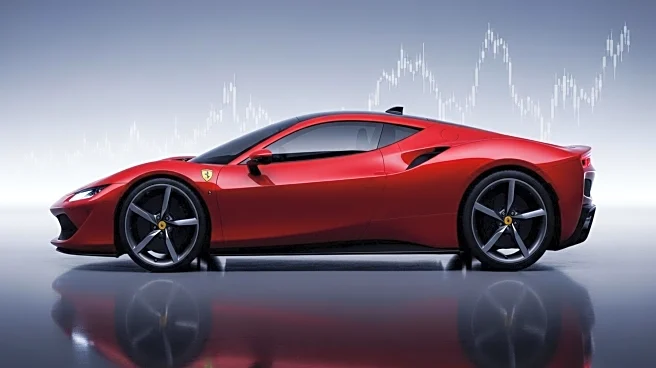What is the story about?
What's Happening?
Ferrari experienced its worst trading day ever after announcing updates to its full-year and 2030 guidance, alongside a reduction in its electrification goals. During its Capital Markets Day event, Ferrari revealed that it expects net revenue of at least 7.1 billion euros for the current year, slightly up from previous forecasts. By 2030, the company anticipates net revenue to reach around 9 billion euros, with a target EBITDA of at least 3.6 billion euros. The luxury carmaker also adjusted its 2030 sports car model lineup, aiming for 40% internal combustion engine cars, 40% hybrid, and 20% fully electric vehicles. This announcement led to a significant drop in Ferrari's stock prices, with Milan-listed shares falling 16.1% before closing down 15.4%, and U.S.-listed shares on the New York Stock Exchange dropping by 15%. Analysts expressed disappointment, noting that the guidance fell short of expectations.
Why It's Important?
The reduction in Ferrari's electrification ambitions and the subsequent stock plunge highlight the challenges faced by traditional automakers in transitioning to electric vehicles. This development is significant for the automotive industry, as it reflects the cautious approach some manufacturers are taking towards electrification amidst market uncertainties. Ferrari's decision may impact investor confidence and influence other luxury carmakers' strategies regarding EV adoption. The stock decline also underscores the sensitivity of market reactions to guidance updates, affecting stakeholders and potentially altering investment strategies. Analysts have noted the conservative nature of Ferrari's guidance, suggesting limited operating leverage and potential risks to earnings per share and valuation multiples in the near term.
What's Next?
Ferrari's revised guidance and electrification strategy may prompt reactions from investors and industry analysts, potentially leading to adjustments in market expectations and investment strategies. The company may face pressure to further clarify its long-term plans for electrification and address concerns about its growth trajectory. Stakeholders will likely monitor Ferrari's performance closely, especially in light of the competitive landscape in the luxury automotive sector. The broader industry may also observe Ferrari's approach as a case study in balancing traditional manufacturing with the shift towards sustainable technologies.
Beyond the Headlines
Ferrari's decision to scale back its electrification goals raises questions about the luxury car market's readiness to embrace electric vehicles fully. The cultural and brand identity associated with Ferrari's traditional combustion engine models may play a role in its cautious approach. Additionally, the company's strategy could influence consumer perceptions and demand for luxury EVs, potentially affecting the pace of innovation and adoption in the sector. Ethical considerations regarding environmental impact and sustainability may also come into play as Ferrari navigates its future direction.
















